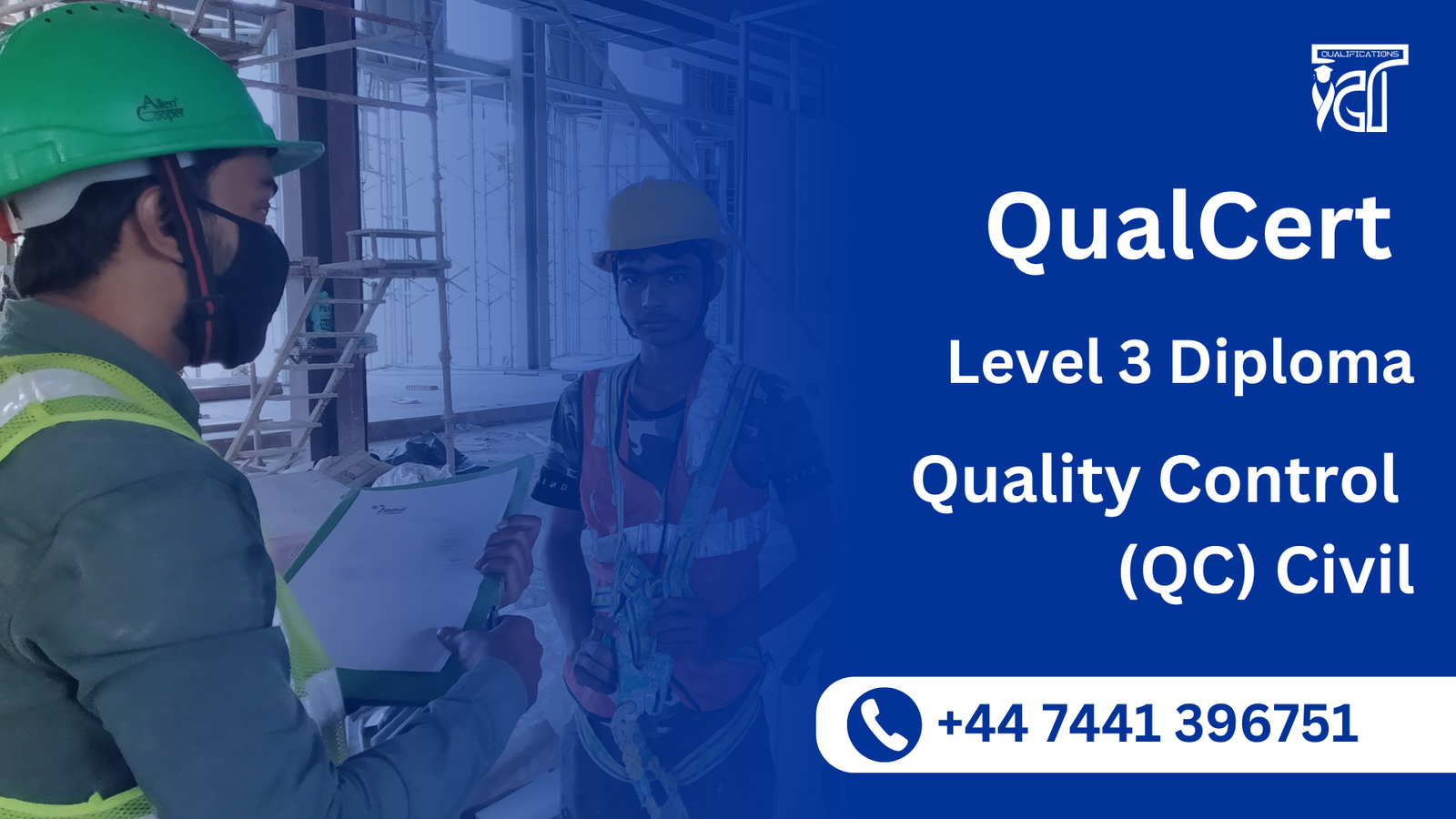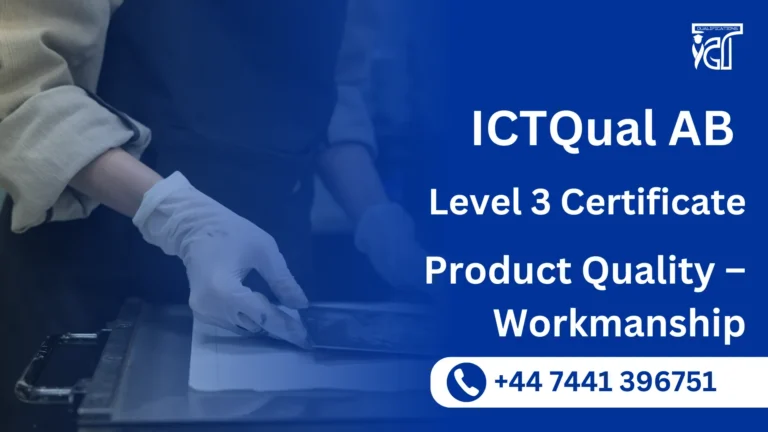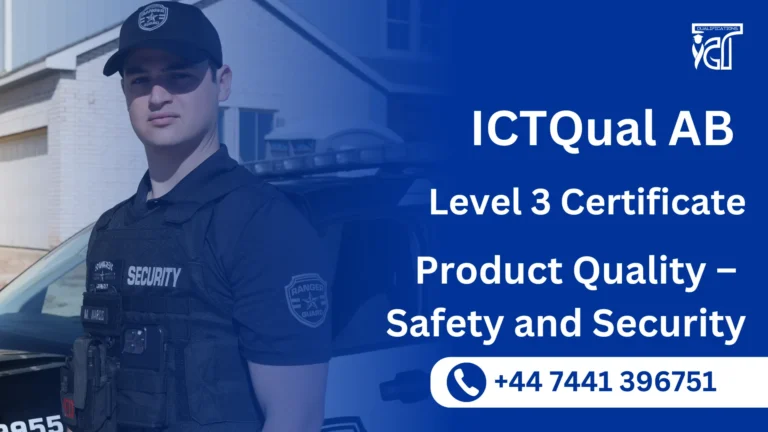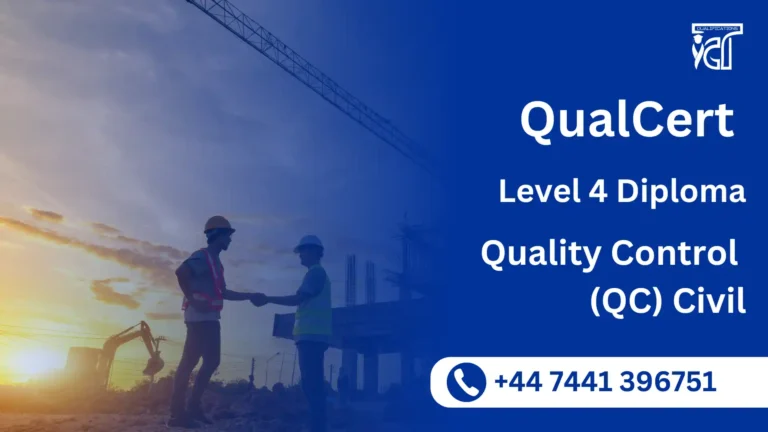The QualCert Level 3 Diploma in Quality Control (QC) – Civil is an introductory qualification designed to equip learners with fundamental knowledge and skills in quality control practices within the civil engineering and construction industries. This course provides a practical understanding of how quality assurance processes are applied across various construction activities, with a focus on compliance, safety, and performance standards.
Ideal for beginners, junior technicians, site workers, or individuals looking to enter the construction quality field, this diploma covers essential topics such as material testing, inspection procedures, quality documentation, and adherence to project specifications. It bridges the gap between on-site activities and quality expectations, ensuring that learners are prepared to support quality control teams effectively.
Whether you are starting your career in civil engineering or aiming to formalize your basic construction experience, the Level 3 Diploma offers a strong foundation to build a successful path in the field of quality control.
QualCert Level 3 Diploma in Quality Control ( QC ) Civil
The QualCert Level 3 Diploma in Quality Control (QC) Civil is structured to provide a comprehensive foundation in quality control practices specific to civil engineering. Below is the qualification structure, including the Total Qualification Time (TQT) 300, Guided Learning Hours (GLH) 210, and 60 Credits associated with the program.
| Unit Ref# | Unit Title | Credit | GLH | TQT |
| QC090009 – 1 | Strategic Quality Planning in Construction | 10 | 35 | 50 |
| QC090009– 2 | Concrete and Steel Testing Techniques | 10 | 35 | 50 |
| QC090009– 3 | Advanced Statistical Process Control | 10 | 35 | 50 |
| QC090009– 4 | Failure Analysis and Remediation Strategies | 10 | 35 | 50 |
| QC090009– 5 | Leadership in Construction QC | 10 | 35 | 50 |
| QC090009– 6 | Industry Best Practices and Innovations | 10 | 35 | 50 |
GLH (Guided Learning Hours) and TQT (Total Qualification Time) are terms commonly used in vocational qualifications to help define the amount of time a learner is expected to spend on their studies.
1. GLH (Guided Learning Hours)
GLH refers to the number of hours a learner spends being directly taught, supervised, or supported during their course. This includes the time spent in activities such as:
- Classroom instruction
- Practical workshops
- One-on-one tutoring or mentoring sessions
- Online learning sessions with tutor support
In other words, GLH represents the time that learners are actively engaged with their instructors or learning activities.
2. TQT (Total Qualification Time)
TQT represents the total amount of time a learner is expected to invest in completing a qualification, including:
- GLH (Guided Learning Hours): Time spent on direct learning, as explained above.
- Self-Directed Learning: This includes time spent on independent study, research, assignment completion, preparation for exams, and any other work the learner does outside of direct teaching hours.
TQT is a broader measure that includes all the time required to achieve the qualification. It helps learners and employers understand the overall commitment required for the qualification.
Key Differences Between GLH and TQT:
- GLH focuses on direct learning with guidance or supervision.
- TQT includes GLH as well as independent study time and other learning-related activities.
Example:
If a qualification has a TQT of 600 hours and a GLH of 250 hours, it means the learner should spend 250 hours in direct learning (classroom, online, or tutor-led sessions) and 350 hours on independent study or research.
1. Strategic Quality Planning in Construction
- Understand the fundamental principles and significance of strategic quality planning in civil engineering projects.
- Learn to develop quality control plans that align with project goals, client expectations, and industry standards.
- Identify potential quality-related risks and implement proactive measures to mitigate them.
- Apply structured planning techniques to achieve consistency and reliability in construction outcomes.
2. Concrete and Steel Testing Techniques
- Acquire hands-on knowledge of standard testing procedures for concrete and steel used in construction.
- Learn how to interpret test results to verify material quality, strength, and compliance with specifications.
- Understand relevant codes and industry standards regulating material testing and certification.
- Apply testing insights to ensure structural integrity and long-term performance of construction materials.
3. Advanced Statistical Process Control (SPC)
- Utilize statistical tools to monitor, control, and improve construction processes.
- Analyze data trends, detect variations, and pinpoint process inefficiencies using control charts and SPC methods.
- Maintain consistent quality output by applying data-driven decision-making practices.
- Support continuous improvement initiatives through effective use of statistical quality control.
4. Failure Analysis and Remediation
- Examine the root causes of material and structural failures within civil construction projects.
- Conduct thorough failure analyses to identify contributing factors and system weaknesses.
- Develop corrective and preventive strategies to eliminate recurring quality issues.
- Assess the impact of failures on cost, timelines, and quality, and recommend effective remediation actions.
5. Leadership in Quality Control for Construction
- Build the leadership competencies required to manage and guide QA/QC teams on construction sites.
- Promote a culture of accountability, continuous improvement, and high-quality workmanship.
- Lead teams in the consistent application of quality control procedures and site-specific standards.
- Communicate clearly and effectively with project stakeholders to uphold quality objectives.
6. Industry Best Practices and Technological Innovations
- Explore current best practices and evolving trends in construction quality control.
- Evaluate new tools, technologies, and systems that enhance quality performance and operational efficiency.
- Implement innovative solutions to streamline processes, reduce waste, and elevate construction quality.
- Stay informed on emerging industry regulations and standards to maintain competitiveness in the field.
Foundation-Level Qualification in Civil QC
Gain a solid introduction to quality control principles and practices tailored to civil engineering and construction environments.
Entry Point for Construction Quality Careers
Prepare for roles such as Quality Control Assistant, Site Inspector, or Materials Testing Technician in civil projects.
Hands-On Understanding of QC Procedures
Learn how to conduct basic inspections, interpret test results, and support quality documentation on construction sites.
Alignment with International Standards
Understand global QC frameworks such as ISO 9001 and ASTM, increasing your employability across local and international markets.
Improved On-Site Competency and Safety Awareness
Learn how to detect quality issues early, reduce defects, and contribute to safer, more reliable construction outcomes.
Supports Career Progression
Acts as a stepping stone to higher-level qualifications, including Level 4 and Level 5 Diplomas in Quality Control or Quality Assurance.
Practical and Job-Ready Skills
Build real-world capabilities in material testing, failure analysis, and quality reporting that are directly applicable to fieldwork.
Enhanced Communication and Teamwork
Develop skills to work effectively with engineers, supervisors, and QA/QC teams in achieving project quality goals.
Adaptability Across Civil Sectors
Suitable for professionals working in infrastructure, housing, road construction, or commercial development projects.
Boosts Confidence and Professional Value
Gain a recognized qualification that improves your credibility and increases your value to employers in the construction industry.
The QualCert Level 3 Diploma in Quality Control (QC) – Civil is designed for individuals at the early stages of their careers who are seeking to build foundational knowledge in quality control specific to the civil engineering and construction industries. The ideal learner for this course is someone who:
- Is New to the Civil or Construction Industry
– Entry-level workers, site assistants, or fresh graduates looking to start a career in construction quality control. - Holds a Basic Educational Background
– Individuals with a secondary school certificate, vocational training, or equivalent qualifications interested in technical or site-based roles. - Wants to Develop Core QC Skills
– Learners who wish to understand quality inspection processes, material testing, compliance standards, and reporting procedures. - Aspires to Work on Civil Engineering Projects
– Ideal for those planning to work in residential, commercial, or infrastructure projects and support QA/QC teams. - Is Practically Oriented
– Those who prefer hands-on learning and real-world application over theoretical instruction, especially in site operations and quality procedures. - Seeks a Recognized Qualification
– Individuals aiming to gain a formal, internationally accepted certificate to improve their employability in the construction industry. - Is Committed to Career Growth
– Candidates planning to progress to Level 4 and Level 5 Diplomas in Quality Control or related civil engineering certifications. - Wants to Contribute to Safer, Higher-Quality Projects
– Learners motivated to ensure construction quality, reduce risks, and enhance project safety and compliance from the ground up. - Is a Support Staff Member Looking to Upskill
– Site workers, helpers, or clerks seeking a transition into technical roles related to quality inspection and documentation. - Is Looking for Job Readiness
– Anyone wanting to quickly gain job-ready skills and practical knowledge to enter the workforce or switch to a quality control role in construction.
Entry Requirements
Register Now
Qualification Process
Qualification Process for the QualCert Level 3 Diploma in Quality Control (QC) Civil
- Self-Assessment:
Begin by evaluating your eligibility to ensure you meet the qualification requirements, including work experience, knowledge, and language proficiency. - Registration:
Complete your registration by submitting the required documents, including a scanned copy of a valid ID, and paying the registration fee. - Induction:
An assessor will conduct an induction to confirm your eligibility for the course and explain the evidence requirements. If you do not meet the criteria, your registration will be canceled, and the fee will be refunded. - Assignmnets & Evidence Submission:
Provide all assignmnets and the necessary evidence based on the assessment criteria outlined in the course. If you are unsure of the required evidence, consult with the assessor for guidance on the type and nature of evidence needed. - Feedback and Revision:
The assessor will review your submitted evidence and provide feedback. Evidence that meets the criteria will be marked as “Criteria Met,” while any gaps will be identified. You will be asked to revise and resubmit if needed. - Competence Evidence:
Submit final evidence demonstrating that all learning outcomes have been met. This evidence will be marked as “Criteria Met” by the assessor once it is satisfactory. - Internal Quality Assurance (IQA):
The Internal Quality Assurance Verifier (IQA) will review your evidence to ensure consistency, quality, and compliance with standards. - External Verification:
The IQA will submit your portfolio to QualCert External Quality Assurance Verifiers (EQA) for final confirmation. The EQA may contact you directly to verify the authenticity of your evidence. - Certification:
Upon successful completion of all checks, QualCert will issue your official certificate, confirming that you have attained the QualCert Level 3 Diploma in Quality Control (QC) Civil.







